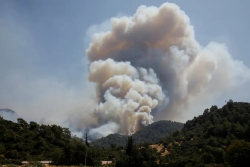

Southern Europe is battling record-breaking heat and a surge in wildfires that have forced mass evacuations, claimed lives, and stretched firefighting resources to their limits.
Temperatures in Spain have soared above 45°C, drying out landscapes and fuelling blazes that have swept across the Mediterranean. Spain, now at the centre of the crisis, has already lost about 148,000 hectares to flames this year, which is more than a quarter of the European Union’s total burned area.
At least seven people, including firefighters, have died, and around 9,500 residents have been forced to flee their homes. Authorities have also arrested ten people on suspicion of arson since June, highlighting both natural and deliberate ignition sources. Spain has appealed to its European partners for aerial firefighting support to bolster its strained response.
In neighbouring Portugal, nearly 1,000 firefighters battled a blaze near the mountain village of Piodao, while crews contained a fire in Vila Real that burned for 11 days, the longest of the season so far.
Greece has also been hit hard, with fires near Patras and on islands including Chios and Zakynthos displacing thousands and damaging farmland and infrastructure. More than 5,000 firefighters and 33 aircraft are working around the clock to contain the blazes.
Turkey has faced several large wildfires, including one in the northwestern province of Canakkale that forced hundreds to evacuate and temporarily closed Canakkale airport and the Dardanelles Strait. A man died in a fire in Albania, while in Montenegro a soldier was killed and another injured when a water tanker overturned during firefighting operations.
Scientists warn that global warming is fuelling hotter, drier summers in the Mediterranean, creating conditions for wildfires to surge in frequency and intensity. Some have become so extreme that they whip up into dangerous “fire whirls”, making them even harder to control.